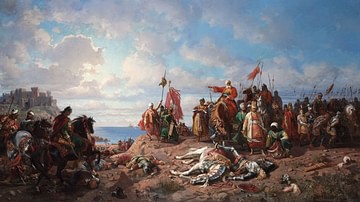Review

| Rating: | |
|---|---|
| Title: | War in the Balkans: An Encyclopedic History from the Fall of the Ottoman Empire to the Breakup of Yugoslavia |
| Author: | Richard C. Hall |
| Audience: | General Public |
| Difficulty: | Medium |
| Publisher: | ABC-CLIO |
| Published: | 2014 |
| Pages: | 436 |
This comprehensive encyclopedia is edited by the acclaimed historian Richard Hall and covers the general topic of war in the Balkans during the past two centuries. Some 60 leading scholars contributed well-examined snippets on the war in the Balkans culminating in a volume that is an excellent reference for a wide range of curious researchers.
Richard C. Hall's timely encyclopedia can help reporters and scholars investigate beyond a headline. The book features informative and expertly written essays with suggestions for further reading. As a leading scholar of Balkan history, Hall, Professor of History at Georgia Southwestern State University who has written multiple books on this topic, is an ideal editor for a work of such monumental scope ranging from the fall of the Ottoman Empire to the dissolution of Yugoslavia and beyond.
To produce nearly 240 entries covering 200 years requires assembling a team of researchers, which is precisely what this work achieved. Altogether, 62 expert contributors wrote entries spanning five categories: Events, Individuals, Organizations, Places, and Treaties.
The most impressive category of contributions is “Events," with 132 topics compromising 56% of all entries. Each war in the Balkans has many entries, and the encyclopedia dedicates five entries to the Balkan Wars of 1912-1913 alone. For these wars, there are separate “Causes” and “Consequences” essays that carefully consider the complex, intertwined factors leading to and resulting from the various Balkan conflicts. The "Events" category contains interesting and rather specific topics not commonly found elsewhere, such as a focus on the “Cold War in the Balkans” and “Ottoman Counterinsurgency Operations in the Balkans and Crete.” The scope of this category is so wide-ranging that it even includes entries covering the roles of Italy and Germany in the Balkans during the two World Wars.
The second category, “Individuals," is smaller, compromising only 24% of the total entries. This section includes an impressive array of people ranging from Ottoman Sultans to modern military leaders and politicians. Nonetheless, with only 56 entries on protagonists of Balkan conflicts, there is a little room for expansion and more coverage, especially with Greek leaders. For instance, figures such as Theodoros Kolokotronis and George Papadopoulos could have been fitting additions to the book's theme. Regardless, most major Balkan individuals are present with each entry on them following the customary high quality.
The remaining three categories — "Organizations," "Places," and "Treaties" — are understandably shorter in length. The category “Organizations” has 32 entries covering 14% of the total contributions. Topics such as the Balkan League, Black Hand, Kosovo Liberation Army, and UNPROFOR were not surprising inclusions. Yet, more concise topics like “Partisans in Albania” or “NATO in the Balkans” were surprising inclusions in a work of this kind. Once more, Greek topics could have been expanded to include groups such as the Philiki Eteria (Society of Friends) or IDEA (Ieros Desmos Ellinon Axiomatikon, or Holy Alliance of Greek Military Officers). The "Places" category could be expanded beyond its current 12 entries by including Cyprus. “Treaties," compromising only 1% of the entries with only 4 topics, could have been a more expansive, general category that included topics like Greater Serbia, Megali Idea, religion, ethnic cleansing, war crimes, and drug trafficking among other issues so intertwined with the war in the Balkans.
Richard Hall’s War in the Balkans is a wonderful addition to the ABC-CLIO/Greenwood Reference collection as its high-quality, accessible, and fascinating articles along with numerous illustrations and maps make the book a must-have for scholars and history enthusiasts alike. In today's digital era, this volume might be dismissed in favor of Wikipedia or other online sources. However, the depth of analysis achieved, along with the detailed and concise topics, is not easily found in traditional encyclopedias. This encyclopedia also offers much more than what students have grown accustomed to in the age before the internet. War in the Balkans is one of those books that hardly sits on a shelf for long.
About the Reviewer
Cite This Work
APA Style
Polemikos, J. (2024, May 14). War in the Balkans: An Encyclopedic History from the Fall of the Ottoman Empire to the Breakup of Yugoslavia. World History Encyclopedia. Retrieved from https://www.worldhistory.org/review/413/war-in-the-balkans-an-encyclopedic-history-from-th/
Chicago Style
Polemikos, John. "War in the Balkans: An Encyclopedic History from the Fall of the Ottoman Empire to the Breakup of Yugoslavia." World History Encyclopedia. Last modified May 14, 2024. https://www.worldhistory.org/review/413/war-in-the-balkans-an-encyclopedic-history-from-th/.
MLA Style
Polemikos, John. "War in the Balkans: An Encyclopedic History from the Fall of the Ottoman Empire to the Breakup of Yugoslavia." World History Encyclopedia. World History Encyclopedia, 14 May 2024, https://www.worldhistory.org/review/413/war-in-the-balkans-an-encyclopedic-history-from-th/. Web. 27 Apr 2025.




